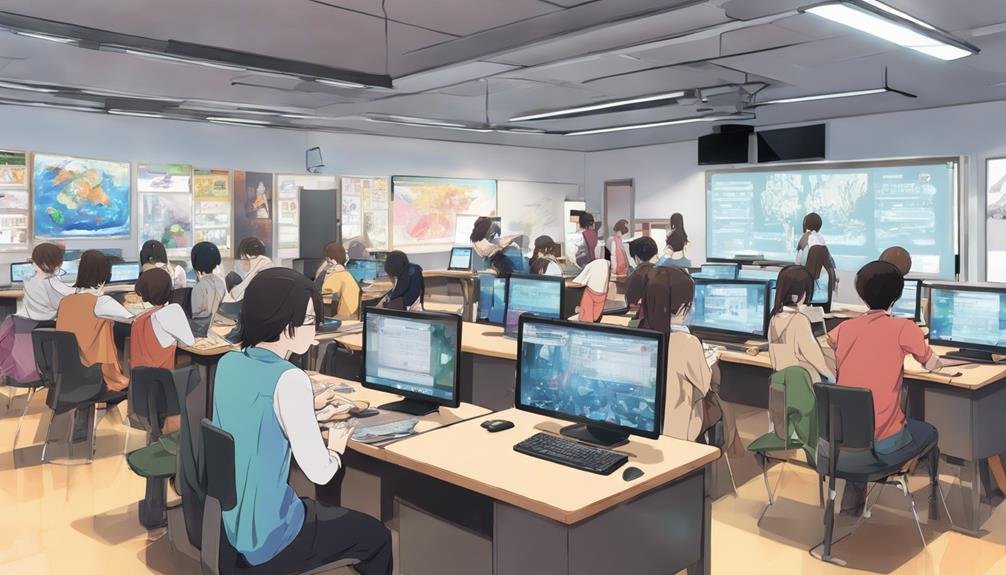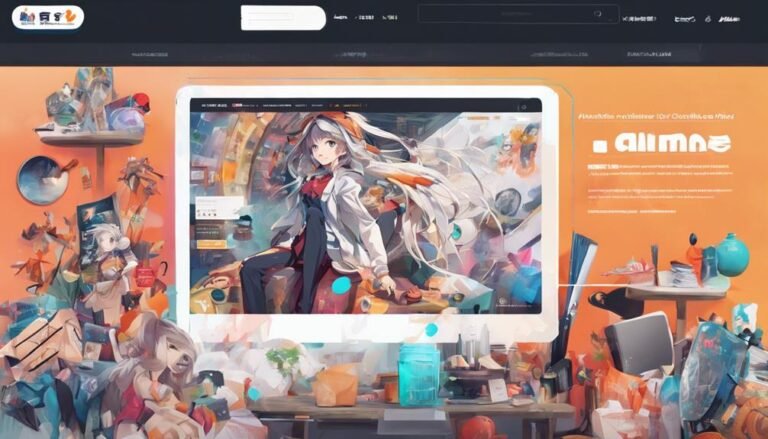What Are the Most Effective Teaching Techniques for Online Courses?
When you think about the most effective teaching techniques for online courses, imagine the impact of incorporating engaging multimedia presentations that bring concepts to life in a way that static text cannot. These interactive elements can truly revolutionize the learning experience for students, but what about the nuances of personalized feedback and the power of gamification? Let's explore how these strategies can elevate online teaching to new heights and create an environment where students thrive.
Key Takeaways
- Engaging multimedia elements enhance learner participation and retention.
- Interactive discussion forums foster collaboration and critical thinking skills.
- Personalized feedback supports individual learning needs and boosts motivation.
- Gamification and interactive quizzes increase engagement and knowledge retention.
- Collaboration in group projects develops essential skills and practical application of course concepts.
Engaging Multimedia Presentations
To enhance learner engagement in online courses, incorporating interactive multimedia elements like videos, animations, and simulations is essential. Visual storytelling through engaging animations and interactive activities can greatly boost student participation and comprehension. Research shows that multimedia presentations increase information retention by up to 65% compared to traditional text-based learning. By integrating dynamic content, such as interactive quizzes or virtual labs, educators can create a more immersive learning experience that caters to various learning styles.
Studies indicate that visual storytelling stimulates the brain, making complex concepts easier to understand and remember. When learners interact with multimedia elements like animations or simulations, they're more likely to stay engaged and retain information effectively. Additionally, the use of interactive activities promotes active learning, encouraging students to apply theoretical knowledge in practical scenarios. By incorporating these strategies into online courses, educators can create a more interactive and engaging learning environment that enhances student performance and satisfaction.
Interactive Discussion Forums
How do interactive discussion forums impact student engagement and learning outcomes in online courses?
Interactive discussion forums play an essential role in promoting peer collaboration and enhancing student learning experiences through virtual simulations. Research indicates that these forums create a platform for students to engage in meaningful discussions, share diverse perspectives, and collaborate on projects. By actively participating in these forums, students can develop critical thinking skills, improve their communication abilities, and deepen their understanding of course materials.
Moreover, interactive discussion forums provide an opportunity for students to apply theoretical knowledge to practical scenarios through virtual simulations. This hands-on approach allows learners to test their understanding in a simulated environment, reinforcing their learning and retention of complex concepts. Additionally, the collaborative nature of these forums fosters a sense of community among students, leading to increased motivation and engagement with the course content.
Personalized Feedback and Support
Interactive discussion forums have been shown to enhance student engagement and learning outcomes in online courses; now let's explore how personalized feedback and support can further optimize these benefits.
Individual progress tracking allows educators to monitor each student's advancement, identify areas of improvement, and tailor feedback to address specific needs. This personalized approach boosts student motivation by acknowledging their progress and providing targeted support where necessary.
Real-time communication plays an important role in offering immediate feedback, clarifications, and encouragement, fostering a dynamic learning environment. Additionally, customized guidance provides students with personalized recommendations and resources to enhance their learning experience.
Gamification and Interactive Quizzes
Gamification and interactive quizzes in online courses enhance student engagement and learning outcomes through interactive and gamified learning experiences. Game-based learning strategies have shown to increase student engagement by making the learning process more enjoyable and motivating. Interactive assessments, such as quizzes that provide immediate feedback, help in reinforcing knowledge and promoting better retention rates among students.
| Benefits of Gamification and Interactive Quizzes | ||
|---|---|---|
| Increased Student Engagement | Enhanced Knowledge Retention | Improved Learning Outcomes |
| Gamified elements make learning fun and engaging for students. | Immediate feedback from quizzes helps students retain information better. | Interactive assessments lead to better academic performance and understanding of the material. |
Utilizing gamification and interactive quizzes in online courses can create a more dynamic and stimulating learning environment, fostering active participation and deeper understanding of the course material.
Collaboration and Group Projects
Incorporating collaboration and group projects in online courses facilitates peer learning and the practical application of course concepts, enriching the overall learning experience for students. Virtual teamwork in online courses can greatly enhance students' ability to work together effectively in a digital environment, mirroring real-world professional settings.
Here are three key benefits of incorporating collaboration and group projects in online courses:
- Peer Evaluation: Peer evaluation encourages students to provide constructive feedback to their peers, promoting a deeper understanding of the subject matter and enhancing critical thinking skills. This allows students to learn from each other's strengths and weaknesses, fostering a collaborative learning environment.
- Enhanced Engagement: Collaborative group projects promote active participation and engagement among students, leading to increased motivation and interest in the course material. Working together towards a common goal fosters a sense of community and accountability among learners.
- Skill Development: Through virtual teamwork, students develop essential skills such as communication, problem-solving, and teamwork, which are crucial for success in both academic and professional settings. These practical experiences help students apply theoretical knowledge to real-world scenarios, preparing them for future challenges.
Conclusion
To sum up, the most effective teaching techniques for online courses revolve around:
- Engaging multimedia presentations
- Interactive discussion forums
- Personalized feedback
- Gamification
- Collaboration
These strategies have been proven to enhance learner engagement, promote critical thinking, and improve overall learning outcomes. By incorporating these techniques into your online course design, you can create an immersive and effective learning experience for your students.
Stay tuned for more insights on optimizing online education for maximum impact.







